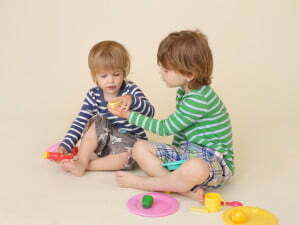Social and emotional skills are a big topic in early education these days, and for good reason. Children need to be able to interact with their classmates and manage their emotions and their behavior in order to learn things like math and geography. Here are some of our blog posts about why they are so important, as well as ways to encourage children’s development of these skills.
One of the building blocks of social-emotional growth is self-regulation. Self-regulation gives us the ability to stop ourselves from grabbing toys from a friend when we want that toy, being able to hold the rules of how to be friendly in our head, and being able to calm ourselves down when we’re upset. Below are some great posts on how to help children develop their abilities to self-regulate and learn how to handle disappointment.
Helping Children to Build Their Self-Control
My Child is Really Upset… How Can I Help to Calm Her Down?
Embracing the Power of Mistakes With our Thoughts, Actions, and Words
Learning how to share is one of the hardest steps for young kids as they develop their social skills. This makes sense! It is developmentally appropriate for young children to seem “selfish” and “bossy” to us as adults. There’s a reason being able to share and act friendly with peers is on kindergarten to-do lists everywhere. Here are some posts with ideas about sharing, when it’s important, and how to encourage your child or student to share.
Learning to Share (Sanely)
Helping Children Learn to Share
Being able to share and being friendly are the cornerstones of making friends! One of the best ways children can practice social-emotional skills is by playing with friends. For some kids, talking to their new friend comes easily, but for others, they might need some pointers. Here are some posts on play, making friends, and tips for friendly conversations.
4 Ways Children Can Make Friends
Helping Children to Have Friendly Conversations
Why Kids Need to Play
Helping Children who Have Experienced Trauma to Make Friends
Once kids have got these basic social skills down, it’s time for the more difficult skills, like recognizing feelings in oneself and others, learning to have empathy and see someone else’s perspective, and handling emotions in helpful ways. Reading picture books can be a great way to teach your child about recognizing feelings in others and practicing perspective taking.
Teaching Young Children about Empathy
Using Picture Books to Teach Your Child Social and Emotional Skills
And of course, how to problem solve when things get tough. Experiencing difficulties with peers and working it out is a crucial social emotional skill, and so is developing resilience and learning how to be your own cheerleader.
Problem Solving 101 for Children (and Adults)
3 Ways You Can Help Your Children Build Resilience
Helping Kids to Start Over with Peers
Teaching Kids to be Their Own Cheerleaders
We hope these posts helped you learn a bit more about the importance of social skills for early learning, and some ways you can support your child or students to grow their social and emotional skills!
[divider type=”standard” text=”Go to top” full_width=”no” width=”1/1″ el_position=”first last”]
Text: © Kids In Transition to School 2019
Image: © Kids In Transition to School










